Key Events: October 26-31
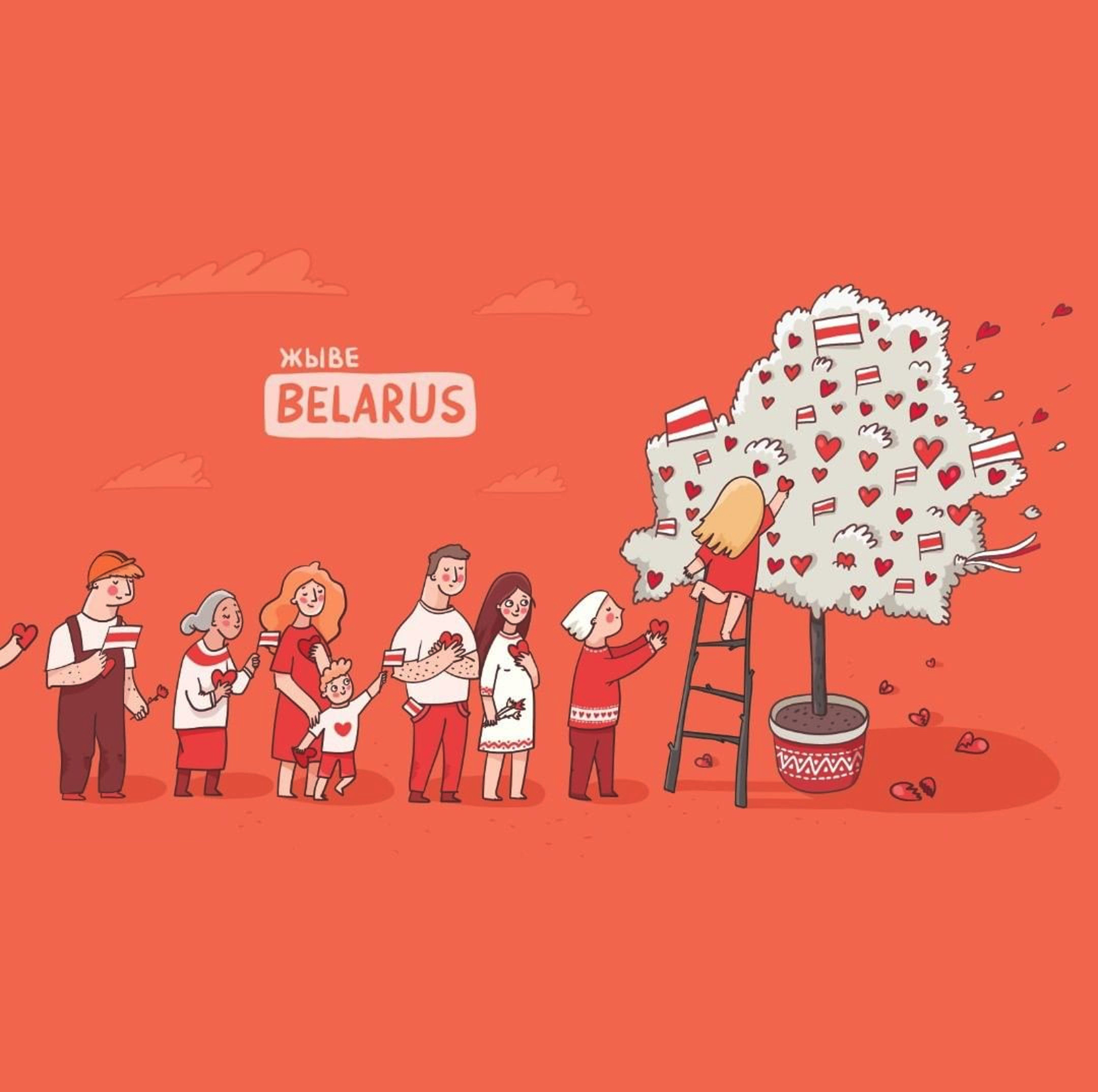
This past week: Border Crisis continues to destabilize Europe, Belarus closes last U.S. diplomacy offices, new prospects of integration with Russia & more.
Announcements
At the E.U. Council Summit, Austria Chancellor, Alexander Schallenberg announced an international conference dedicated to the peaceful resolution of the Belarusian crisis. The conference will take place in Vienna on November 22, 2021.
How can the E.U. use sanctions on Belarus as an effective policy tool
Virtual discussion hosted by Belarus Research Center of Sviatlana Tsikhanouskaya on November 2, 2021.
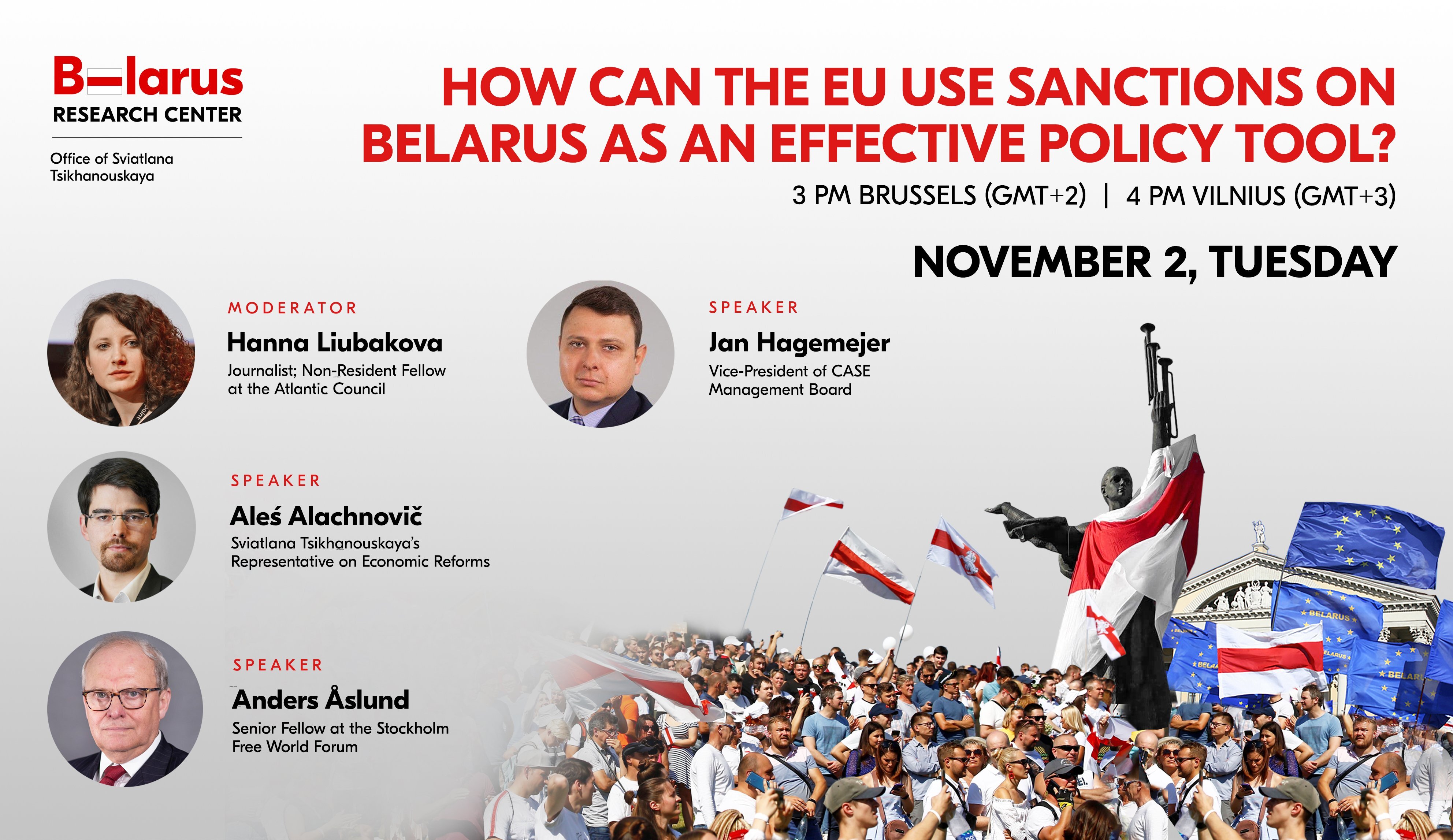
Top Stories
Oct 31: Journalist charged with “Treason” for investigating riot police
The Belarusian authorities brought treason charges on Belarusian journalist, Dzianis Ivashyn. Under Article 356 part 1 of the Criminal Code he could face 7 to 15 years. Dzianis was detained a day after he published an article about former fighters of the special unit “Berkut,” who served Lukashenka’s regime in Belarus.
Oct 29: German broadcaster DW blocked in Belarus
German public news outlet Deutsche Welle has been marked by Belarusian Ministry of Information as “spreading extremist material”. The head of DW Peter Limbourg called allegations ridiculous and pointed out that the use of independent news outlets shows that people in Belarus no longer trust government-controlled media.
Oct 26: Nobel laureate Svetlana Alexievich speaks about human rights in Belarus
The United Nations facilitated an online conference on the issue of Belarus. Among the main topics was the situation with human rights and civil liberties. The specially invited guest, 2015 Nobel Prize laureate Svetlana Alexievich, talked about the transformation of Lukashenka’s repressions from targeting protestors to trying to eradicate any descent by eliminating civil society in Belarus.
Oct 29: Western envoys in Minsk commemorate victims of soviet terror
Western diplomats to Belarus honored the memory of 132 Belarusian intellectuals, writers and poets, executed by the NKVD (predecessor of KGB) on the night of October 29, 1937. The diplomats brought flowers to Kurapaty, a wooded area and a place of executions of the victims of the Soviet Great Terror, now a memorial on the outskirts of Minsk. The Belarusian propagandists loyal to Lukashenka’s regime attempted to disrupt the ceremony.
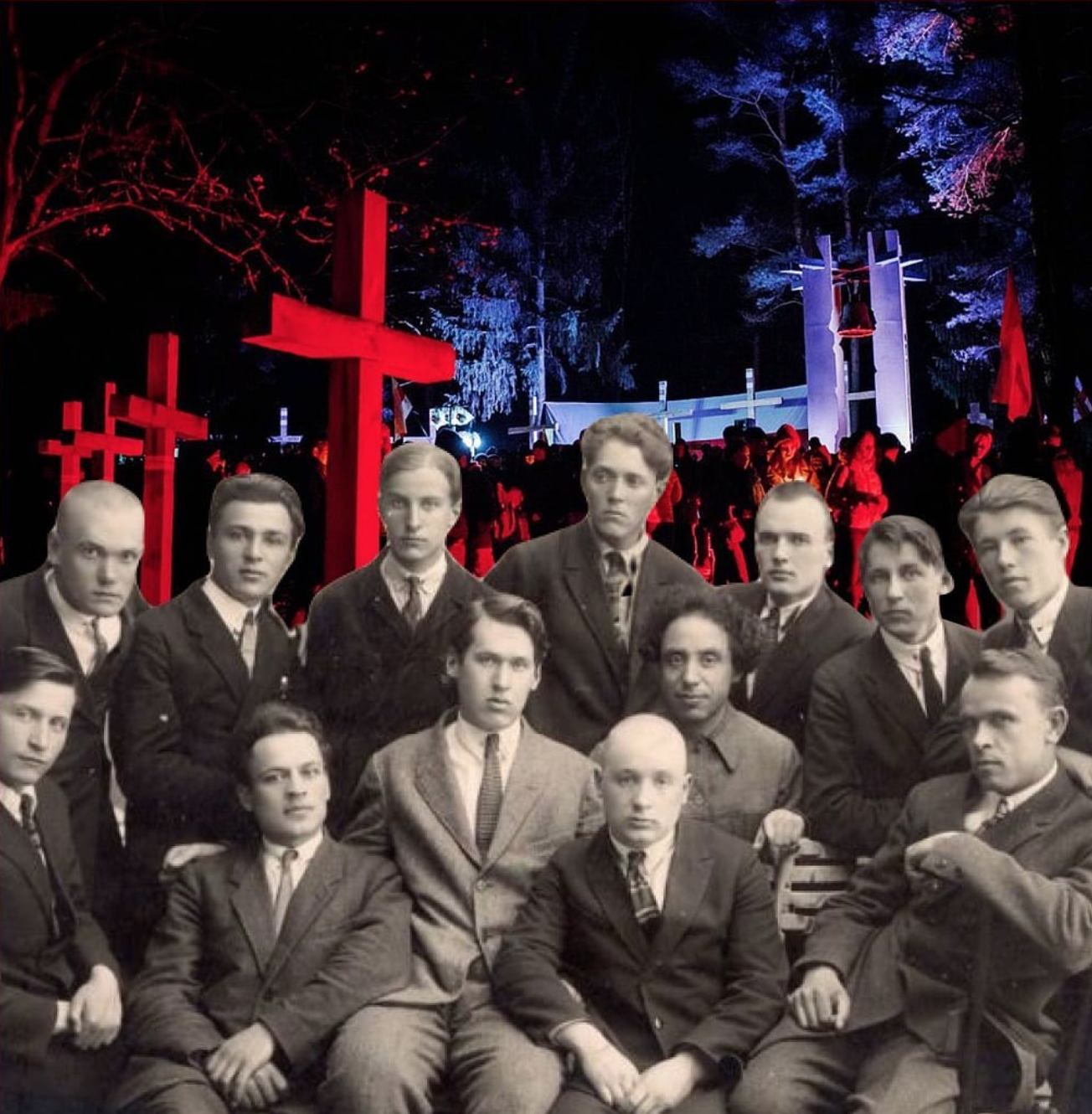
Border Crisis
Background: In the past months, tens of thousands of migrants mainly from the Middle East, Africa and recently Palestine have been lured by the Lukashenka regime to fly to Belarus on tourist visas, and then travel onward to the E.U. borders of Poland, Lithuania, and Latvia. More than 20,000 crossings have been stopped and at least eight people have already died. According to the E.U., the artificial migrant influx is orchestrated by Russian and Belarusian states to destabilize and infiltrate Western democracies. The three EU nations have described this human trafficking, paired with active anti-West propaganda as “hybrid” warfare. Poland and Lithuania are now constructing border walls. Major news channels from Reuters, Independent to Bloomberg are now paying close attention to the issue.
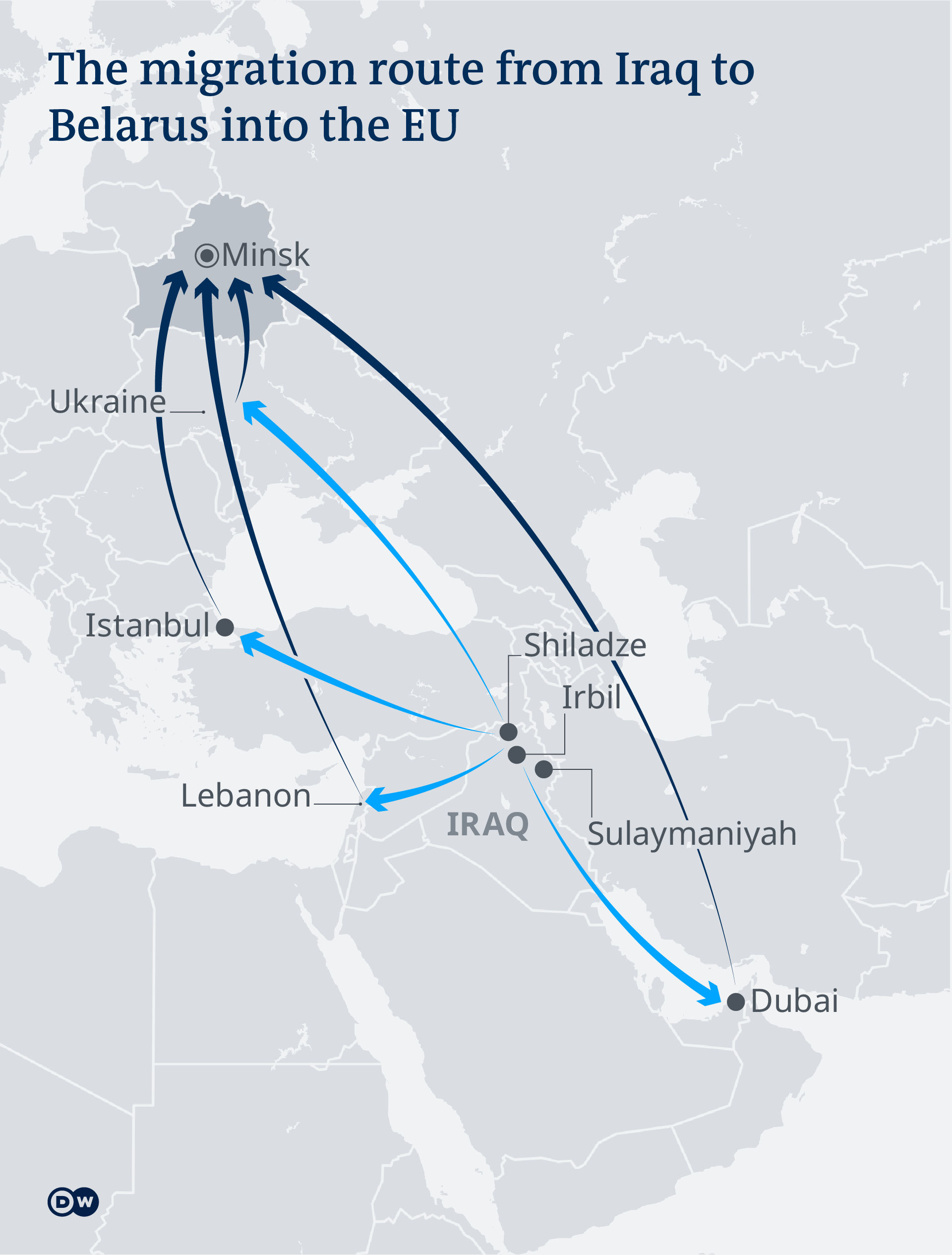
Oct 27: How Russia and Belarus are weaponizing migration
As the border crisis continues to unfold, it becomes obvious that Lukashenka never acted alone. Carefully planned international logistics operations of shipping people from war-torn areas to the Eastern European borders could not have been put together without Russia’s direct involvement. With the reports of Russian nationals also embedded into the migrant crowd, the operation begins to resemble the hybrid war previously staged by Russia in Ukraine, better known as the “Little Green Man” invasion.
Oct 27: The route from Iraq to Belarus: How are migrants getting to Europe?
The article talks about the logistics of people smuggling from the Middle East into the EU via the Belarus route. The scheme appears to be well orchestrated. People are lured by empty promises of ease of passage into the E.U. and a quick path to prosperity once there. Airlines, tourist agencies are involved to reap benefits with the total cost of the trip estimated to be between $14,000 and $17,000. Belarus’ government plays a key role to keep the scheme going by continuously adapting it to the new restrictions introduced by the E.U.
Oct 26: Poland plans ‘radical’ strengthening of its military
Poland’s ruling party leader presented plans for a homeland defense bill to increase the defense budget and to more than double the size of the military to at least 250,000 soldiers and 50,000 reserves. He said the change is needed due to a deteriorating international situation and also to Poland’s geopolitical location, specifically “Russia’s imperial ambitions” and the hybrid warfare waged by Belarus using migrants.
Oct 27: Fifth sanctions package to affect all involved in fostering migration
Dirk Schuebel, Head of the E.U. Delegation to Belarus, said the 5th package of sanctions against the Lukashenka regime will be primarily leveled against individuals and companies responsible for smuggling migrants from the Middle East and Africa to the European Union through the territory of Belarus. The adoption of the fifth package is expected to be in November.
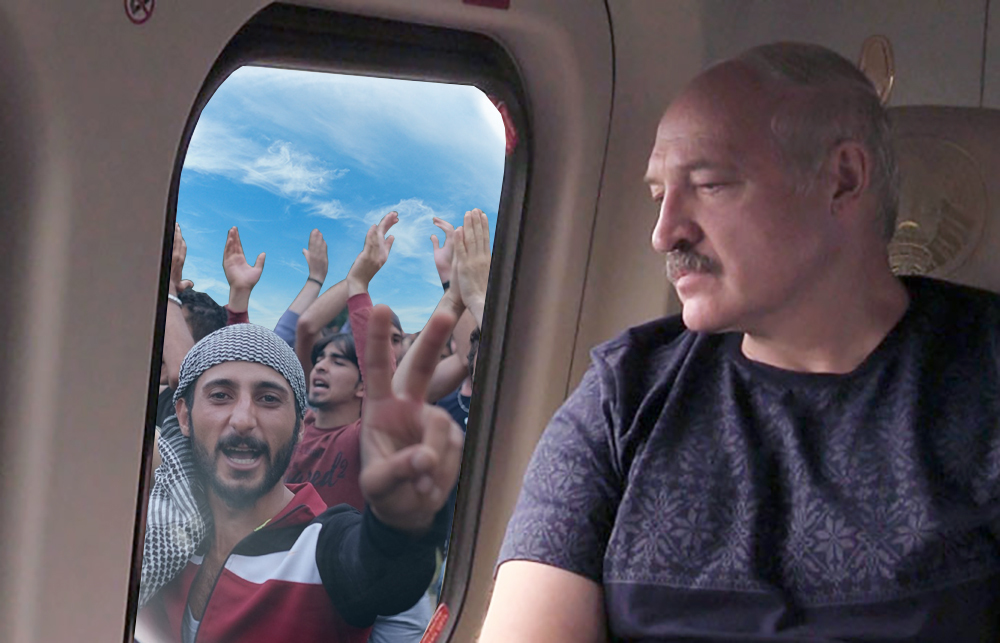
Opinion
The truth about the hybrid warfare masterminded by Lukashenka and Putin is that it unfortunately works. The European Union has never quite recovered from the migration crisis of 2015 that created a lot of division within the member states on how to deal with the problem. As refugees continue to cross Belarusian borders and Eastern European partners begin to erect walls, the Parliament is again divided between its humanitarian and conservative views. Far-right activists in Germany are already self-organizing, ready to take actions against the incoming settlers, while Lukashenka-controlled travel agencies are counting profits made on people’s dreams of entering Europe. The core difference to be grasped here is that unlike the West, post-soviet authoritarian leaders do not actually care about human rights and migrants’ well-being. Putin sees it as Europe’s weakness and uses every possibility to exploit it. The United States now more than ever needs to recognize that and aid their European allies to ensure the security in the region.
Analysis
Oct 27: Lukashenkas resignation or economic crisis are not the aims of sanctions
iSANS published an interview with Clara Portela, professor at the University of Valencia and former senior analyst at the E.U. Institute for Security Studies (E.U. ISS). The topics covered include the current state, purpose and novelties of the latest round of EU sanctions against the Lukashenka regime.
Repressions in Belarus
Background: The Lukashenka regime ruthlessly and methodically continues to repress anyone who has been participating in last year’s protests and is exhibiting any signs of disenchantment with the regime. Since October 16 the number of political prisoners has risen to 831 people. Below are examples of the regime’s retaliation against its people for exercising their human rights. More information about the scale of repressions and deterioration of the human rights situation in Belarus could be found at Viasna Human Rights Center, Belsat Channel & Amnesty International.
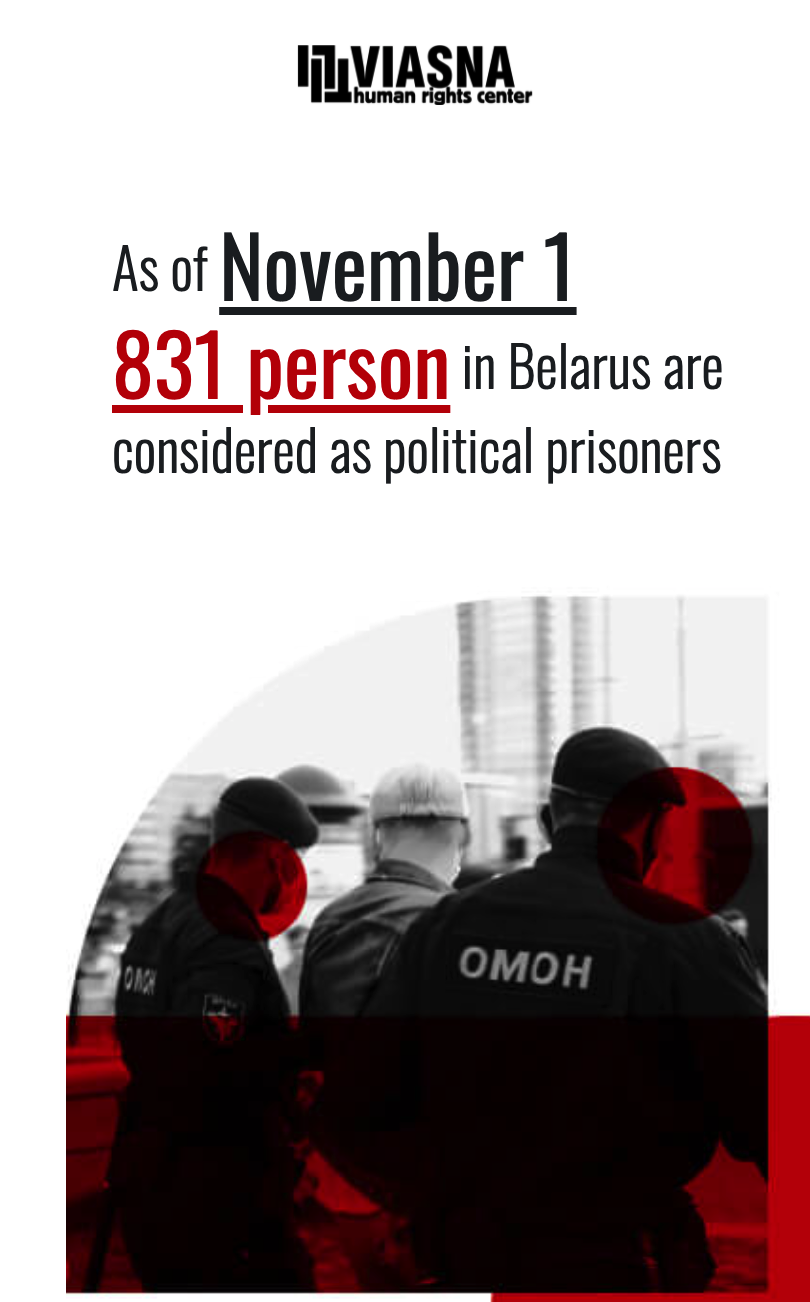
Oct 26: Belarusian authorities retaliate against lawyers defending human rights
Two more lawyers who represented Viktar Babaryka, former presidential contender arrested on politically motivated charges in June 2020 in the run-up to the August 9 election, are disbarred by the Minsk Bar Association. The decision came soon after they had filed an appeal in Babaryka’s case. At least 27 lawyers have so far been banned or suspended for speaking out against ongoing repressions.
Oct 26: Women under fire in Belarus, activists tortured and exiled
While women in Belarus overall are being denied rights and freedoms, female political activists are subjected to enforced disappearances, torture, ill-treatment and exile, an independent UN human rights expert told the General Assembly. This comes as part of a broader repression of human rights and political freedoms in the country. The expert suggested that courageous Belarusian women and girls served as “a model for women and girls everywhere who seek respect for their right to a better life, free of violence and discrimination”.
Oct 26: Wave of detentions for subscribing to “extremist” Telegram channels
Belarusian police have detained dozens of people in Homiel on charges of subscribing to “extremist” social-media channels in the latest crackdown on freedoms in the country. Authorities have declared hundreds of opposition Telegram channels and social-media sites “extremist” since August 2020.
Oct 30: Belsat representative in Belarus Iryna Slaunikava arrested
Belsat’s official representative Iryna and her husband have been arrested at the airport upon returning to Belarus from Egypt. They are currently held in the notorious Akrestina prison.
Belarus and the United States
Oct 29: Belarus forces to close U.S. public diplomacy, USAID offices
Belarus forced the closure of USAID offices in Minsk effective November 20. In the official statement, the USAID Administrator Samantha Powell expressed regret concerning the decision, calling it a disregard of the interests of the Belarusian people. Over the many years of operation, USAID helped thousands of Belarusian create businesses, build civil society organizations, assist Belarusians with disabilities and much more. US State Department spokesperson Ned Price and Special Envoy to Belarus Julie Fisher have also reaffirmed that the U.S. will continue to support the democratic aspirations of Belarusian people despite the insecurities of the Belarusian authorities. The Foreign Policy draws parallel between the actions of Lukashenka in regards to the US agencies in Belarus to the actions of Putin’s cutback in the US diplomatic force in Russia.
Belarus and Russia
Oct 27: Has Lukashenka’s anti-NATO gambit paid off with Putin?
As the days of Belarus politics of wiggling between Russia and the West appear to be over, Lukashenka has no other choice but to go all in on the relations with Russia. All the scary stories of NATO invasion that used to be the prerogative of Russian propaganda, are now being pushed around by the Lukashenka’s regime as well. Agreeing to expansion of Russia’s military footprint, Lukashenka appears to be ready to sacrifice even Belarusian sovereignty in order to cling to some remnants of his power.
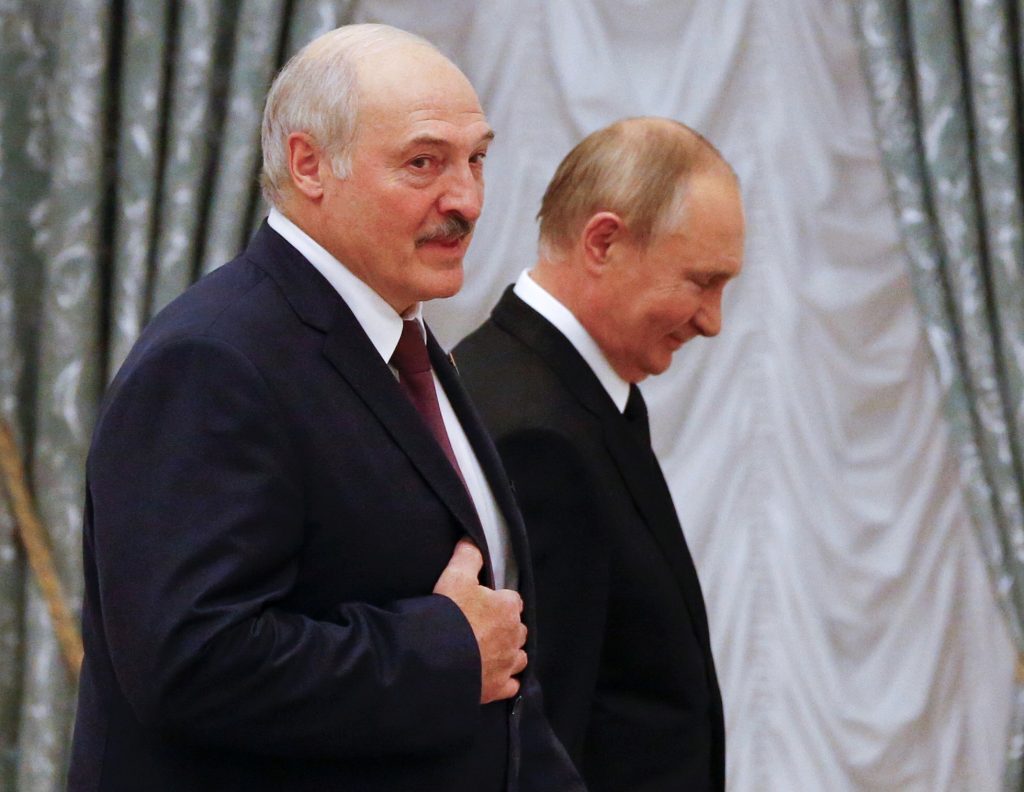
Opinion
Lukashenka continues to push a fear mongering agenda at his meetings with the top Belarusian and Russian officials. During a recent meeting with Russian Prosecutor General Igor Krasnov, the authoritarian leader claimed that it is in fact Western countries that continue military build-up at the Belarusian border and promised an “adequate” response. Simultaneously, Lukashenka tries to prove that he is not under complete control of Putin’s government, while also playing the “we are brothers" card with his Russian counterparts. Recently, Belarus blocked access to the pro-Kremlin Russian media source Regnum and Russian newspaper “Komsomolskaya Pravda”. In response, the Russian news agency Ekho Moskvy interviewed Sviatlana Tsikhanouslaya, the leader of democratic forces of Belarus. Nonetheless, the tensions between Lukashenka and Putin will not impact the general support of the Belarusian regime by the Russian Federation. Putin is using the Lukashenka’s vulnerability to keep Belarus in his realm of power and continue to push for Union State agenda. The integration will be discussed again on November 4 during the meeting of the Supreme State Council of the Union State, which despite Lukashenka’s expectations, Putin will participate in online. Ultimately, Putin wants to increase Russia’s military presence in Belarus, which provides him with a platform for westward political and economic expansion. It also puts major pressure on Ukraine and other neighboring countries, which are already worried about Russian troops movement.
Interesting Read
Cats, crows and planet Earth: drawings by Belarusian political prisoners
In Belarus, the past and present collide
Stranded in Belarus: one Syrian’s bid to rescue his parents near Polish border
